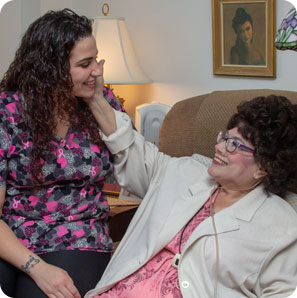
There are many reasons someone may need assistance with dementia care programs. Some of the benefits include: the ability to provide 24-hour supervised care to someone with advanced dementia; a caregiver can assist the individual in performing everyday activities such as bathing and dressing. In later stages, the person may experience confusion and aggression. This condition can be challenging for the patient and their family members. This article will discuss the benefits of a dementia care program as well as the costs associated with its use.
Programs to care for the elderly
Medicaid Waivers is a government-funded program that allows individuals with disabilities to receive health care outside of a nursing facility. They may receive care at home, in the homes of relatives, in an adult foster care home, or in an assisted living residence. To qualify for Medicaid benefits, individuals must have specific functional limitations and meet specific financial requirements. Medicaid benefits are available to help with the costs of care for many patients suffering from Alzheimer's disease.
A caregiver may use respite to take some time off from caring for someone with Alzheimer's. The service may provide assistance in the home, at a facility for elderly people, or at a center for adults with disabilities. It can last from a few hours until several weeks. Respite care services can be used by caregivers as long as they are needed. Respite care is usually charged per day or per week and most insurance companies do not cover them. Families are responsible for paying the entire cost of the services.

Resources for family caregivers
Although it is easy for family caregivers and loved ones to feel overwhelmed when caring for someone with dementia or their loved ones, they don't have all the answers. Texas has many resources that can be used by family caregivers. The National Institute on Aging has helpful tips for family caregivers. They also have information on dementia and its symptoms. The National Institute also offers information on dementia treatment, including clinical trials, and other research findings.
These groups can also prove to be an invaluable resource. These groups provide a safe and positive outlet for caregivers to process their feelings and seek help. Caregiver support groups can offer caregivers the opportunity to connect with other caregivers and gain insight from them. AARP also offers a guide that can help family caregivers find local resources and find a dementia care program. However, if you are in the process of deciding whether or not to enroll your loved one in a dementia care program, it's a good idea to speak with a professional.
Costs
Although dementia care costs can be expensive, it is possible for loved ones to afford the care they need. You will need to take medication, visit the doctor, and treat any related medical conditions. This will help you maintain your quality of life. Many seniors are able to live comfortably and independently for many years even after being diagnosed. Medicaid covers nursing home costs, but it may not be affordable for all families. There are many options for paying for dementia care.
Although the disease itself is incurable, the cost of dementia care programs is still much higher than the costs of other chronic diseases. In 2010, the average Alzheimer’s patient paid approximately $41,000. By 2040, this amount is expected to double, reaching nearly $511 billion. These costs are largely out-of-pocket. It is therefore important to understand the payer options. The patient's care will be affected by the budget of the facility.

Impact on the health care system
Programs for dementia care can improve the quality and life expectancy of people with dementia. They are becoming more widespread and popular because they offer personalized care and cost-effectiveness. The federal government has provided significant funding to help train medical students. Medicare's graduate medical education program focuses on hospital-based training and identifies dementia as a high-priority area of shortage. It is important to expand the number of funded training programs beyond hospitals in order for dementia care to be met.
The research team examined 38 possible dementia policy options. Based on their findings, the research team identified 25 priority policy options that could improve the quality of care, reduce costs, and increase access to dementia-specific LTSS. These policy options address the issues that patients and caregivers face, such as stigma, inadequate access to care and reliance on external services. These policy options address the health-care system's challenges. They include the need to integrate dementia care programs and improve community resources.